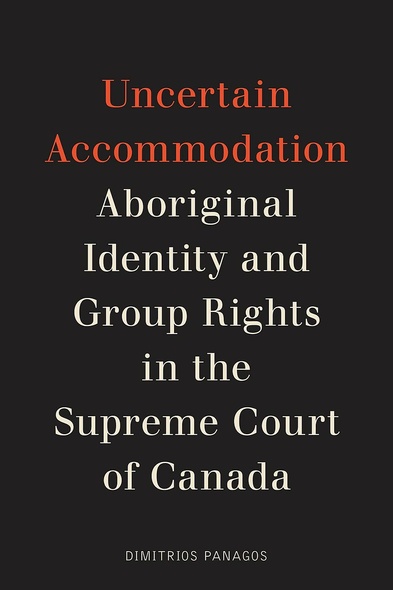
Uncertain Accommodation
Aboriginal Identity and Group Rights in the Supreme Court of Canada
In 1982, after decades of determined mobilization by Aboriginal groups and their allies, the government of Canada formally recognized Aboriginal rights within its Constitution. The move reflected a consensus that states should and could use constitutionally enshrined group rights to protect and accommodate subnational groups within their borders. Decades later, however, almost no one is happy with the current state of Aboriginal rights in Canada. To some, these rights go too far; for others, they do not go far enough; still others contend that these rights merely perpetuate the ongoing projects of assimilation and colonization.
In Uncertain Accommodation, Dimitrios Panagos argues that the failure of Canada’s Aboriginal rights jurisprudence is ultimately rooted in our inability to agree on what aboriginality means. Through incisive analysis of judicial decisions, legal submissions, and academic debates, he reveals the plurality of conceptions of aboriginality put forth over the past three decades and shows that the singular vision of aboriginality promoted and protected is that of the Supreme Court of Canada itself. Because this vision is fundamentally different from that of Aboriginal people, the court’s jurisprudence not only fails to protect their interests, it actually threatens them.
Panagos concludes that there can be no justice as long as the state continues to safeguard a set of values and interests defined by non-Aboriginal people.
This book will be of interest to scholars and students of law, Aboriginal studies, the social and political sciences, postcolonial studies, and identity politics.
This book is highly recommended for professionals, scholars, and graduate students or simply for those interested in understanding how the state handles identity and group-related rights.
…Panagos succeeds in giving the intricate and controversial topic of aboriginality thorough treatment in a concise manner. Uncertain Accommodation generates interesting discussion that accommodates all readers, regardless of legal expertise … [This book] adds to the literature by providing a balanced and sophisticated analysis of where Canadian jurisprudence went wrong regarding the definition of Aboriginal rights, and what can be done to improve the situation.
With clarity and insight, Dimitrios Panagos traces the origins and subsequent judicial interpretations of section 35 of the Canadian Constitution Act, 1982, and shows that the Supreme Court’s jurisprudence has failed to take seriously the self-understandings of Aboriginal peoples. This highly readable book powerfully demonstrates how theory and legality can illuminate each other, and it reveals the distance that Canada has yet to go to build a sufficiently rich conception of its relationship with Aboriginal peoples.
Dimitrios Panagos is an assistant professor in the Department of Political Science at Memorial University. His research appears in a number of academic journals, including Politics and Gender; Social Sciences Quarterly; Canadian Journal of Political Science; and Commonwealth and Comparative Politics.
Introduction
1 The Historical and Legal Framework for Section 35
2 Competing Approaches and Conceptualizations of Aboriginality
3 The Case for a Relational Approach
4 The Nation-to-Nation, Colonial, and Citizen-State Approaches
5 Submissions to the Court
6 What the Justices Said
7 Aboriginal Rights Jurisprudence and Identity Contestation
8 A Problematic Conception of Rights
Conclusion
Notes
References
Index



















